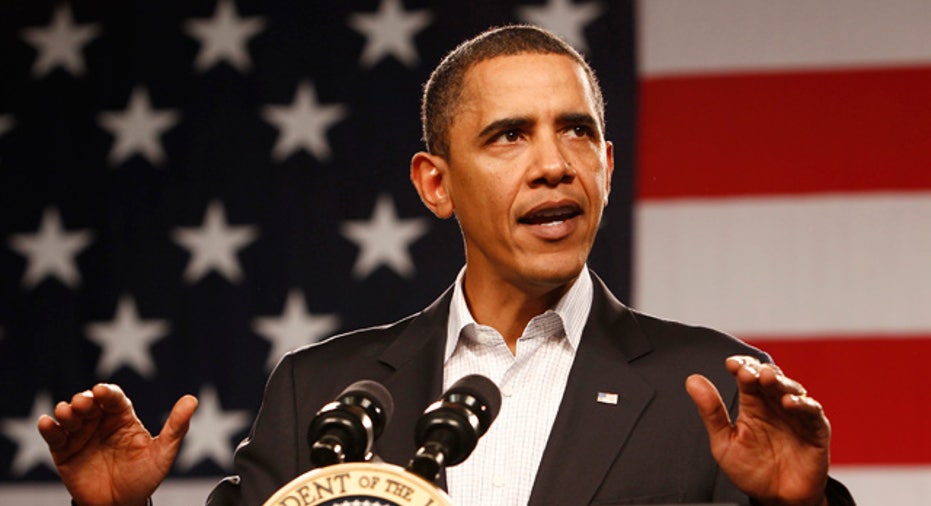Amid Dueling Debt Plans, Obama to Address Nation

Top U.S. lawmakers dueled with diverging debt plans on Monday that offered little compromise and raised the threat of a ratings downgrade and national default as President Barack Obama prepared to address Americans on the impasse.
Little more than a week before the Aug. 2 deadline to raise the $14.3 trillion debt ceiling, Republican and Democratic leaders traded blame in an acrimonious standoff as they pursued separate budget proposals, with no clear path to bring them together.
The stalemate rattled investors worldwide, sending stocks and the dollar down and pushing gold to a record high, but falling far short of the panicky sell-off that some politicians in Washington had feared after weekend talks broke down.
Raising the stakes and seeking to seize back control of the debate, the White House said Obama would address the nation at 9 p.m. EDT about ``avoiding default and the best approach to cutting deficits.''
While administration officials have called a U.S. government default -- it would be the first in history -- ''unthinkable'', the showdown risks badly denting the image in global markets of the world's largest economy and only superpower, and threatening its recovery from recession.
Republicans in the House of Representatives unveiled details of a two-stage deficit reduction plan that would start with an initial $1.2 trillion in savings over 10 years. Obama is sure to oppose it because it would raise the debt limit for only a few months, something he has said he will not agree to.
Obama's Democrats presented their plan for $2.7 trillion in deficit reduction over the next decade but with a debt limit hike that would carry through the November 2012 elections, when Obama and many lawmakers are up for re-election.
Republicans control the House and Democrats control the Senate.
Republican House Speaker John Boehner dismissed the Democratic plan as ``full of gimmicks.'' Senate Democratic Leader Harry Reid insisted ``extremists'' within the Republican Party must not be allowed to dictate the outcome of the debt impasse.
Neither plan may be enough to avert a downgrade by ratings agency S&P, which has indicated it wants to see a $4 trillion deficit reduction plan over 10 years. Critics said both sides appeared more interested in scoring political points than forging compromise.
With markets increasingly focused more on the risk of a damaging cut in U.S. Treasury bonds than on the prospects for an unprecedented federal default, the stage was set for growing investor alarm if the stalemate goes down to the wire.
``PLAYING WITH FIRE''
``They are playing with fire and they could well be burned. No compromise would put us in unknown and dangerous territory at a very delicate moment for the world economy,'' said Carlos Vegh, economics professor at the University of Maryland.
Joining a growing chorus of global concern, the International Monetary Fund urged swift U.S. action on its debt to avert broad negative fallout. [ID:nLDE76O176]
Singapore sovereign wealth fund GIC said it saw a long-term U.S. debt problem and Ng Kok Song, GIC's group chief investment officer, said it was not simply a question of whether Congress was able to lift the borrowing ceiling in time, the Straits Times newspaper reported.
A lower credit rating could raise borrowing costs not only for the U.S. government but also for other countries, companies and consumers because U.S. Treasuries are the benchmark by which many loans are measured.
Obama and congressional leaders have tried to reassure global markets that the country will be able to service its debt and meet other obligations after Aug. 2, when the United States will run out of money to pay all of its bills.
Should the impasse in Congress prove unbreakable for raising the debt ceiling, some legal scholars say Obama still has a constitutional escape hatch at his disposal, although he has expressed reluctance to resort to it.
He could bypass lawmakers and invoke a little-known clause of the 14th Amendment of the U.S. Constitution, which states that the United States' public debt ``shall not be questioned.''
Boehner's plan would raise the debt limit in stages, forcing Congress to confront the politically painful issue again before the November 2012 election.
It proposes $1.2 trillion in spending over 10 years while providing a short-term, $1 trillion increase in the government's borrowing limit. It includes no tax hikes.
``It would be irresponsible for the president to veto this legislation,'' Boehner told reporters.
DOUBTS OVER VOTE SUPPORT FOR PLANS
But Boehner has had trouble roping in Tea Party-aligned Republicans who have been leery of any compromise after the fiscally conservative movement helped the party win control of the House in last November's elections.
``I vote no,'' said Republican Representative Todd Akin after being briefed on the Boehner plan. Another Republican representative, Jim Jordan, who leads a bloc of 178 House conservatives, said he would not support Boehner's plan.
Reid laid out a $2.7 trillion spending-cut plan that includes savings from domestic and defense programs and would provide borrowing authority to meet needs through 2012. It would include $1.2 trillion in savings that Democrats say Republicans already had agreed to.
The White House quickly endorsed Reid's approach and told the Republicans the ``the ball is in their court.''
In the Senate, Reid needs at least 7 Republican votes to advance his bill, and some liberal Democrats may decide that it gives too much away.
Reid's plan amounts to a substantial concession, as it includes no tax increases and calls for cuts to discretionary spending that Democrats had initially resisted. But it shields cherished programs like the Medicare health insurance program for the elderly and disabled and the Medicaid health insurance program for the poor.



















